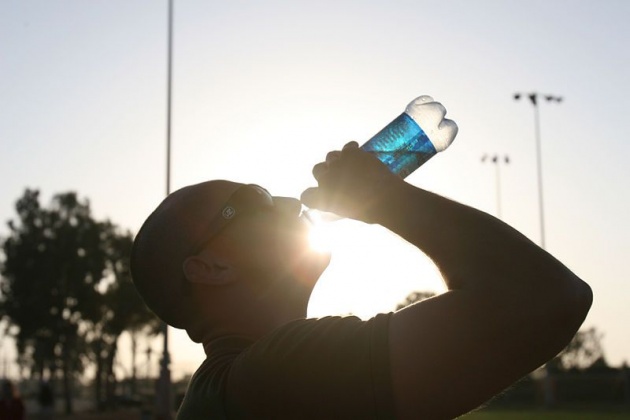
1. Pick the right water.
As a general rule, I try to avoid hydrating beverages that have added sugar. In addition to having fewer calories, I think it’s also important to choose hydrating beverages that don’t have sugar in order to prevent spikes in insulin levels. Going into a sugar crash compounded with the already-unpleasant sensation of dehydration? Count me out. Plus, if you happen to be sick with diarrhea during a hot summer day, sugary beverages can actually worsen your symptoms.
2. Snack on the right foods
Fresh veggies and fruits are good snacks this time of year, and not just for dieters. Fresh produce has a very high water content, so it’s a great way to hydrate without having to drink a ton of water. For example, an apple is up to 85% of water by volume.
Pickles (and pickle juice) are higher in electrolytes than beverages like Gatorade or Powerade, and have been shown to reduce cramping cause by exertion in high temperatures. The acetic acid in pickles and pickle juice are considered superior to the citric acid found in commercial sports drinks, at least when it comes to rehydration properties.
Another food you should add into your diet when staying properly hydrated is a concern are chia seeds. In addition to being high in protein, the seeds themselves help you to retain water by absorbing many times their own weight in water. If you can’t find the actual seeds, you may be able to find a chia seed gel at runner’s/sporting good stores or health food stores.
3. Drink constantly, not occasionally.
You should be constantly drinking fluids, rather than guzzling multiple liters of water all at once.
Let me put it this way: when you go to the hospital and get an IV drip, it’s a DRIP… meaning that you get a slow but steady introduction of fluids. You never see anyone getting an IV drip at the speed of a gushing fire hose.
It is better to have frequent, small amounts of fluid…especially if the dehydration is severe. Too much fluids at once can induce stomach upset or vomiting.
The amount of water you need in a given day depends on the environment, your activity level, and what other food and drink you have consumed. That being said, work towards drinking 2-3 liters of water per day.
Break up that amount of water into a cup or so every hour, and you’ll have a good, healthy intake of water. Drinking too much water in a very short period of time can put too much strain on your eliminatory processes, so finding the right balance is important.
4. Avoid diuretic behaviors.
By which I mean, don’t do anything that you know will dehydrate you. In addition to exercise, also watch out for alcohol and caffeine. You might feel groggy when you get to the office… avoid your usual cup of coffee and go for a large glass of water. You might be surprised at how much more effectively the water perks you up.
5. Make it easy on yourself.
It’s hard to stay hydrated when you don’t have water nearby. Keep a couple bottles of water in the fridge at work, or in the trunk of your car (you never know when you’ll be stranded somewhere in hot weather.) Pick up a small sports bottle that will fit in your purse or briefcase, and you’ll always have water close at hand. When the water is close to you, you’ll actually remember to drink it. (And don’t be afraid to set an alarm on your watch or phone every 30 minutes to remind you to drink!)



